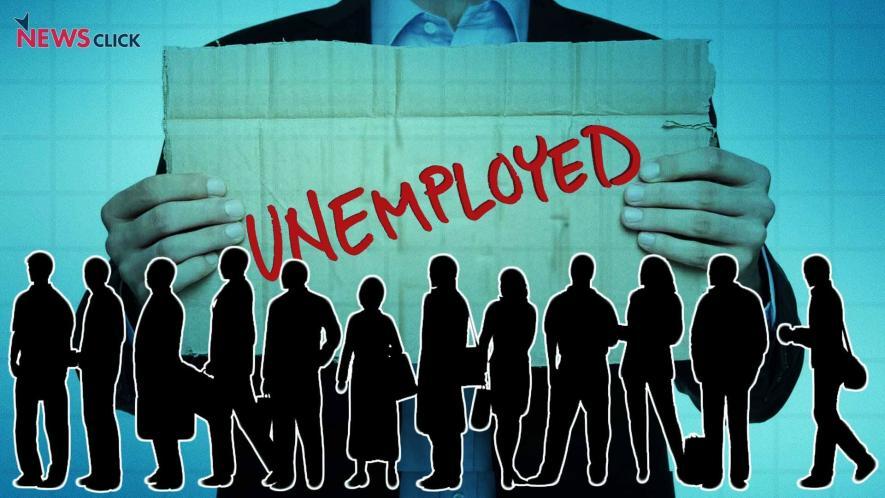Insecurity Clouds Govt Job Security as Number of Jobs Tanks in 5 Years

Sudhanshu Singh exemplifies the eagerness with which job aspirants search for employment in the public sector and consider themselves plain lucky if successful. “I earn half of what I used to earn in a private job but I am happier and feel secure about my future,” the clerk with a government department in Azamgarh, Uttar Pradesh (UP), says.
Singh, who quit his doubly paying IT job in Bangalore,
is among the crores of graduates/postgraduates who seek ‘prized’ government jobs for their benefits, security and often pension.
Unfortunately, this sense of security is gradually being replaced with fear going by the massive reduction in the recruitment for government jobs in the last five years of the Narendra Modi government. The total number of candidates recruited by the Union Public Service Commission (UPSC) reduced by around 30% from 6,103 in 2016-17 to 4,399 in 2019-2020, the government informed the Lok Sabha last year.
Recruitment examinations for the Staff Selection Commission (SSC) have been hindered by scams and delays. The number of recruitments done by the Institute of Banking Personnel Selection (IBPS) for the posts of clerks and probationary officers (POs) has reduced as well.
The recent violent agitation by the aspirants of non-technical popular category (NTPC) examination of the Railway Recruitment Board (RRB) over the results of first stage Computer Based Test of Centralised Employment
Notification CEN 01/2019 of NTPC issued by RRBs on January 14-15 points to the anxiety against the Railways, which is being gradually privatised despite more than 2 lakh vacancies.
The jobless in UP are extremely worried about the dire situation and disappointed. “When Modi contested the Lok Sabha elections in 2014, he promised more than 10 million jobs every year. Naturally, we expected an increase in the number of government jobs,” says Shivam Kumar, a jobseeker from Gazipur, adding, “but ever since he became PM, the number of jobs is reducing—SSC, banking, Railways or states.”
The government’s concern for the youth is a “farce”, Kumar says mentioning the drastic fall in the number of PO vacancies. “From 15,000 a year, the IBPS has reduced the number of vacancies to 1,500,” he adds. “My family and I have been staunch supporters of the BJP for a long time. But given the current situation, we won’t vote for it neither in the Vidhan Sabha election or the next Lok Sabha election.”
A retired train ticket examiner, Somwesh Tiwari, from Chandauli, is worried about his two jobless graduate sons. “We are waiting for job openings in the education sector. Hopefully, my sons will be employed soon. Lot of posts at schools are vacant,” he says while also sceptical “if this will happen under the Modi-Yogi [Adityanath] regime”.
Tiwari puts forth a simple logic. “If you provide jobs and job security to the people, they will earn and spend, which will boost the economy. Our government shouldn’t be a profit-making organisation. Clearly, the government’s ideals of a welfare state have drifted too far away,” he says adding that the present situation warrants voting for another party. “I have seen since my childhood how my extended family always supported the BJP. But when we think about our children, we think we should vote for another party.”
Rajesh Kumar, the former district president of the Rashtriya Swayamsevak Sangh (RSS), Chandauli, and a current member, is also critical of the decline of the public sector. “My family and I have been actively supporting the BJP and the RSS. But I accept that the number of jobs and vacancies in the public sector have drastically reduced under the BJP regime,” he says.
Questioning the ‘cost-saving’ tactics of the government to outsource work through contractual hiring, Kumar says, “You may have noticed that low-level jobs, like that of a clerk, in government hospitals, universities, offices and post offices are being outsourced. Contractual employees are ready to work for a low salary of Rs10,000-Rs 15,000 without not much job security. Low-level posts in banks are being filled up on contract basis as well on salaries that are one-third of the salary a government clerk.”
Shekhar Kumar, a UP Provincial Civil Services aspirant from Allahabad, feels that the decline of the public sector directly affects the upliftment of the most vulnerable sections. “I think the reduction in the number of public sector jobs is an indirect way to arrest reservation. It will eliminate the constitutional reservation system,” he says.
The UPSC’s recruitment for the Indian Administrative Service (IAS) or the Indian Public Service (IPS), the most sought-after jobs, has tanked by almost 40% since 2014 despite the dearth of enough IAS and IPS officers. Rahul Kumar, a civil services aspirant from Lucknow studying in Delhi, is confused about the vacancies and the government’s claims. “On one hand, the government claims a shortage of civil servants in its report. But it has advertised 861 posts this year as against around 1,200-1,300 in the previous years,” he says. “So, on the other hand, the government doesn’t want to fix the shortage.”
Lateral entry into civil services through the UPSC might affect the prospects of aspirants. Lateral entry aims to recruit skilled specialists from the private sector to senior positions in the bureaucracy on contractual basis.
Concerns have been expressed about the lack of reservation in lateral entry. “The government can hire anyone who supports its ideology,” says Kumar pointing to the “government’s agenda of populating the bureaucracy with people supporting its ideology at the cost of constitutionally necessity”.
The writers are freelance journalists.
Get the latest reports & analysis with people's perspective on Protests, movements & deep analytical videos, discussions of the current affairs in your Telegram app. Subscribe to NewsClick's Telegram channel & get Real-Time updates on stories, as they get published on our website.
























